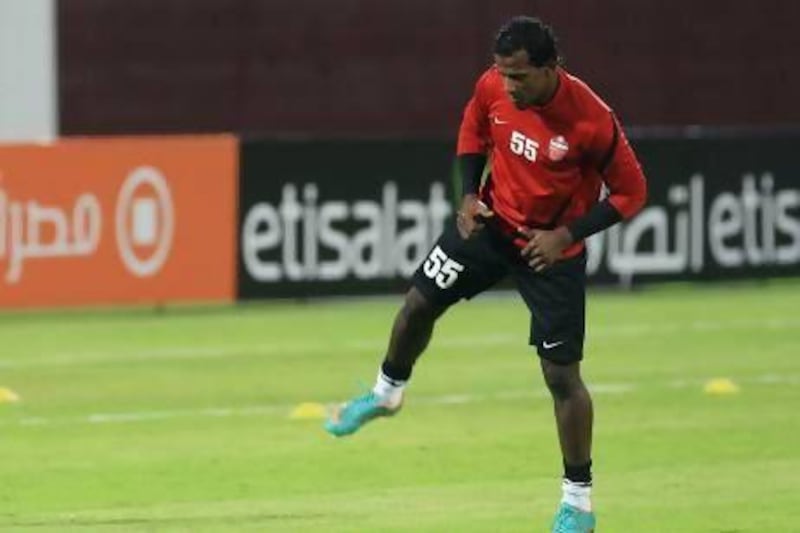Majed Naser has a record for misbehaviour that would make even Mario Balotelli, Manchester City's controversial striker, wince.
The Emirati goalkeeper, widely recognised as his country's best, since 2007 has been banned for 13 matches (later reduced to five) and 17 matches. His own club last season demanded the Football Association suspend him for an entire season, and his actions have prompted more apologies than a forgetful husband.
Yet, if last week's President's Cup display did not offer redemption commensurate with his latest relapse, it reminded that, beneath the hullabaloo and the headlines, Naser remains a master of his trade.
"This game was a good opportunity for him to show his talent," said Quique Sanchez Flores, the Al Ahli coach, after watching Naser mark his debut by twice thwarting Al Dhafra in a penalty shoot-out and guaranteeing progression to the quarter-finals.
"He needs this kind of performance and responsibility to find a good feeling," the manager added.
Responsibility and good feelings had long been repelled. Naser, having already built a reputation as a magnet for mischief, imploded in the space of three months earlier this year, first in slapping Sanchez Flores, then an opposing manager, at the end of an Etisalat Cup encounter in March, and then by butting an opponent in the second leg of June's GCC Champions League final.
The initial indiscretion resulted in the 17-match eviction, the second increased the punishment to six months and convinced his club, Al Wasl, to suggest the FA forbid Naser from playing throughout the 2012/13 campaign.
Officials at the Zabeel Stadium considered writing to his employers - Naser, ironically, is a policeman - to request in future they refuse his exemption from duty.
"The reckless and irresponsible act shattered the club's dream of winning the [GCC Champions League] title," Wasl said in June. "It had a negative effect on the outcome of the game and turned victory, which looked certain, into defeat."
So incensed by his conduct were fans of Wasl, after the shock defeat to the Bahrain side Muharraq, that Naser had to be taken out of his home stadium under police escort.
Only months previously, he had threatened to slip out of football for good. The Sanchez Flores episode sparked a hasty announcement of his immediate retirement, made, regrettably, on television.
At 27, Naser's career seemed extinct. Wasl appealed for a rethink, international teammates pleaded for a change of heart; even Sanchez Flores added his voice to the chorus.
"He's an important player for the league and UAE football, and still has a lot to offer," the coach said, revealing Naser travelled to his home to apologise on the same night as their confrontation.
Saying "sorry" represents a familiar footnote, as the 13-match ban for assaulting a linesman in 2007 provoked one apology, as did his public rebuke of teammates after a league defeat at the beginning of this year.
"It was a really poor performance by the players, and if they are not held accountable then the management should allow me to leave," said Naser, who at the time was tied to Wasl until 2014.
Following a "frank talk" with the club, he said: "I regret the comments I made, but those words came out only because of my love for Al Wasl. I get really disappointed when we lose."
Perhaps the desire to win, underpinned by his obvious talent, explains Naser's compulsion to combust.
Some, in jest, point to his formative years in Fujairah, where he excelled despite, rather predictably, serving a one-year suspension in 2001 for striking a referee and throwing a rock at the official's assistant during a youth team match.
A transfer to Wasl then delivered the league and cup double in 2007 and attracted lucrative offers from rival clubs, with Naser establishing himself as the national side's No 1, eventually being capped 61 times.
A mistake in a World Cup qualifier in 2009 aside, he routinely proved the UAE were in safe hands: standing strong in the cauldrons of Tehran, Pyongyang and Riyadh, while underlining his abilities at the 2010 Gulf Cup and last year's Asian Cup.
A succession of national coaches, from Bruno Metsu to Srecko Katanec to Abdullah Misfir, acknowledged Naser's propensity to deliver by continually entrusting him as the country's last line of defence.
"Majed is the best in the UAE and one of the best in the GCC," Metsu said earlier this season. "He has great qualities, but sometimes he fights too much. You need to help Majed, to understand him; not fight him."
While Naser the player is instantly inflammable, Naser the person has oft been painted as anything but. Diego Maradona, maybe unaware that only months before his arrival at Wasl his goalkeeper received a one-match suspension for throwing a chair during a match, said after the Sanchez Flores fiasco: "I've never seen him do anything that would imply he is a violent person."
Haidar Ali, the Al Wahda captain and common comrade in the national team dressing room, spoke of how Naser "plays hard on the field, but off it is one of the friendliest persons you can find".
John Burridge, the vastly experienced former goalkeeper who coaches at Wasl's academy, described Naser as a "well-mannered, well-educated young man".
Naser's capricious temperament will be under closest scrutiny during the next few months at Ahli. A free transfer in the summer shocked, but if Sanchez Flores can curb his custodian's wild enthusiasm, Naser's precarious professional future could find firmer foundation.
"Majed has an artistic personality and a lot of talent; everyone knows he is the UAE's best goalkeeper. We will aim to maximise his potential in a different way than previously," said Sanchez Flores, who in the same breath added his new signing must be "carefully" managed. Although he has been here many times before, Naser now appears resolute.
"I learnt a lot in the previous period, especially off the pitch," he said. "There is no room for mistakes in the future."
At 28, and with a litany of lawlessness on the pitch, the man born on the first day of the fourth month must prove, finally, he is no April fool.
[ jmcauley@thenational.ae ]
Follow us
[ @SprtNationalUAE ]






